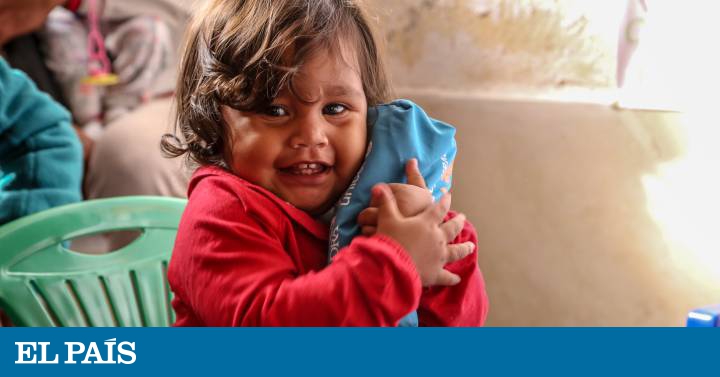The coronavirus has affected us all, but some more than others. For the more than five million Venezuelans who left their country and now live in others in Latin America and the Caribbean, the blow has been enormous. Ary, 17 years old, left Venezuela 8 months ago and lives in Ecuador with her older sister. There, the girl cleaned houses to send her mother between $ 15 and $ 20 each month. But overnight, Ary lost her already precarious livelihood.
MORE INFORMATION
PHOTOGALLERY Venezuelans in Peru: visible to the virus, invisible to society- “This house was always family. Now we are the two that we can not use "
- Latest news of the coronavirus in Latin America
In Latin America, where coronavirus cases continue to rise every day, the pandemic and its containment measures left many refugee and migrant workers in the informal economy without income and without access to basic services. They left their country in search of improving a situation that is increasingly adverse to them in times of pandemic.
Now many are on the streets, suffering from hunger and living in the open. Many, especially boys and girls and women, are at risk of being exposed to exploitation and abuse. With the focus of governments in the region on the public health response to the pandemic, refugees and migrants from Venezuela are becoming the most vulnerable of the vulnerable to the coronavirus. Because of the covid-19, it is estimated that this year about two million Venezuelan refugee and migrant children, and the host communities, will be further affected by their already difficult reality. This figure doubles that of 2019. Almost one in three people in need of humanitarian assistance is a minor.
Desperate, thousands of families have chosen to return to Venezuela. Due to border closings, they have been separated in the region, unable to reunite with loved ones. Many children have been hit by the pandemic alone.
We cannot forget that isolation measures have put refugee and migrant children, women and girls at increased risk of domestic violence. As countries begin to reopen, it is essential that they have access to educational and protection services, as well as opportunities to obtain some means of subsistence.
Desperate, thousands of families have chosen to return to Venezuela. And they have been separated in the region, unable to reunite with their loved ones. Many children have been hit by the pandemic alone
Many neighboring countries have taken commendable measures in recent years to include the Venezuelan population in their social programs. But national capabilities have reached a critical point. Now more than ever, the support of the international community is needed to ensure that these populations receive the support they require. Humanitarian and development assistance must be strengthened. Otherwise, there is a high risk that the results achieved so far will be reversed and the losses will be even greater, not only in financial terms but in human lives.
In 17 host countries in Latin America and the Caribbean, UNICEF, UNHCR and IOM work with governments and civil society to support the refugees and migrants most exposed to the pandemic, with a special focus on children and adolescents. To prevent the spread of the virus within the framework of the R4V Regional Interagency Coordination Platform, we have enabled remote care channels, safe shelters, distributed prevention and hygiene messages, reinforced health care, and improved access to drinking water and soap . No one is protected unless the entire population is protected.
We are aware that, after the emergency, it will be important to join efforts for reconstruction. From this moment, hand in hand with the receiving States, we are promoting the inclusion of refugees and migrants in the existing health and social systems. After this pandemic, this qualified population willing to be part of the necessary reconstruction should also be given access to the labor market in each country.
It is imperative that the international community respond. We are facing a major humanitarian crisis that is not seen and that requires international support. In the coming days the International Donors Conference will take place in solidarity with the refugees and migrants from Venezuela, convened by Spain and the European Union, with the support of UNHCR and IOM. In this framework, it is essential that donor countries find the way to continue supporting the humanitarian and protection response, particularly for the most vulnerable in this context.
Unless the international community more strongly supports host countries, there is a high risk that millions of Venezuelan refugees and migrants in Latin America and the Caribbean will be left behind, increasingly invisible by the coronavirus.
José Samaniego is UNHCR's regional coordinator for the response to refugees and migrants from Venezuela. Diego Beltrand is a special envoy of the IOM Director General for the response to refugees and migrants from Venezuela and Bernt Aasen is Unicef regional director for Latin America and the Caribbean.
You can follow PLANETA FUTURO on Twitter and Facebook and Instagram, and subscribe here to our newsletter.

